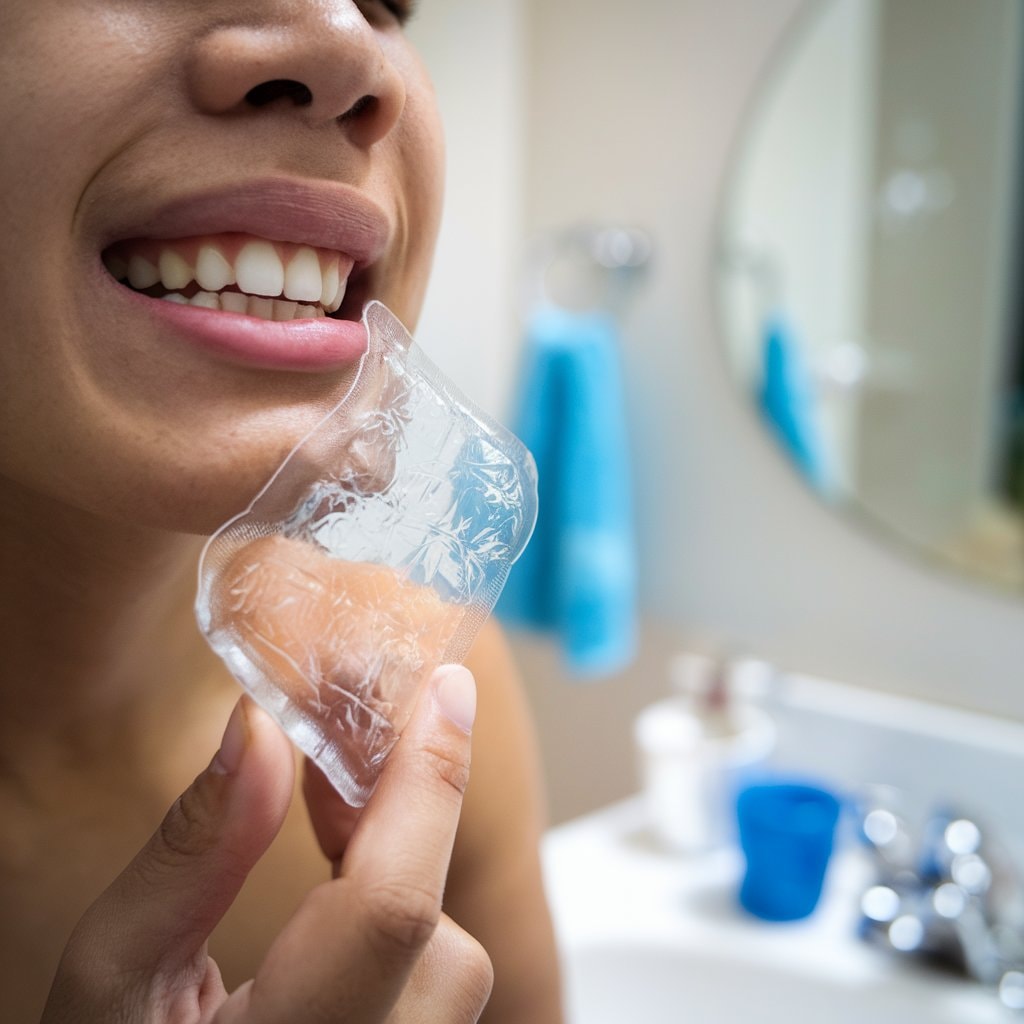After getting dental implants, many people wonder what comes next. You may feel lost on how to take care of your new teeth. One key fact is that proper aftercare is crucial for the healing process and long-term success of maintaining your dental implants.
This blog will guide you through everything about what to do after dental implants, from dealing with common symptoms like minor bleeding at the implant site to ensuring good oral hygiene.
We’ll share practical tips on managing discomfort, eating right, and preventing infection around the implant. Keep reading for essential advice that helps your implants last a lifetime.
Let’s get started!
What can I expect from dental implant surgery?
Transitioning from the overview to the detailed discussion on dental implant surgery, let’s explore in depth what this procedure entails. The process of dental implant surgery generally involves multiple steps spread out over several months.
The initial stage involves your dentist or surgeon inserting the titanium implant into your jawbone below the gum line. This stage is of utmost importance as it creates an opportunity for osseointegration, the phenomenon where the implant forms a bond with your bone.
In the meantime, you might be equipped with a temporary denture.
The healing period varies but typically stretches over some months, highly dependent on the successful fusion of your jawbone with the implant – a factor vital for the longevity of the procedure.
After the surgery, mild discomfort and swelling are common symptoms, which can be effectively managed with prescribed medication and the use of ice packs to curb inflammation. Patients are instructed to adhere to rigorous post-procedure care instructions like consuming soft food and refraining from intense physical activities to promote proper healing and avert potential complications like infection or implant failure.
How Long Does the Healing Process Take?
The healing process for dental implants can vary from person to person but generally follows a timeline. After implant placement, the initial healing period takes about 2 to 6 months.
During this time, the implant fuses with the jawbone, a crucial step for long-term success. Most patients can resume normal activities within a few days after surgery, but complete integration with the jawbone and full mouth recovery can take many months.
Dental implants require patience and diligent care during the healing abutment phase to ensure they last as long as natural teeth.
Eating soft foods, avoiding strenuous exercise, and following your dentist’s advice on oral hygiene are vital steps in this process. Regular check-ups play an essential role in monitoring the fusion of the implant with your bone structure.
Ensuring that no infection occurs is extremely important since it could severely limit healing or lead to failure of the dental implant procedure.

What Are Common Symptoms of Dental Implant Pain?
Common symptoms of dental implant pain include a throbbing sensation at the site of the dental implant. Patients often describe this as a constant ache that doesn’t subside naturally.
Another frequent complaint is increased sensitivity around the implant area, making it hard to consume hot food or cold drinks without discomfort. Some patients experience bleeding that persists for more than an hour, indicating the need for immediate attention from their dental clinic.
Swelling and bruising around the surgical site also signal post-surgical pain linked with dental implants. In cases where infection sets in, the discomfort can intensify, leading to increasing pain and swelling not relieved by regular painkillers.
If physical exertion leads to a spike in these symptoms or if they do not improve over time, contacting your dentist becomes crucial for assessing any complications and preventing further issues with your oral health.
What Should I Do About Bruising and Swelling Around the Implant?
Bruising and swelling are common after dental implant surgery. Apply gentle pressure with a clean handkerchief or a bag of frozen peas to the swollen area. This method helps reduce swelling by constricting blood vessels near the surgical site.
Keep your head elevated, even when sleeping, to further decrease swelling.
Eating soft foods can also aid in healing and lessen discomfort around the implant area. Avoid hot drinks, alcoholic beverages, and strenuous exercise for at least 24 hours post-surgery.
If pain or bleeding persists beyond what is normal, contact your dental care provider immediately for guidance. Always follow your dentist’s instructions on taking prescribed antibiotics and over-the-counter pain medications to prevent infection and manage any discomfort effectively.
What Should I Do Immediately After the Implant Procedure?
After your implant procedure, care for the surgical site is crucial. You should avoid brushing directly on it to prevent irritation. Instead, gently rinse your mouth with a teaspoon of salt in a cup of warm water, especially after meals.
To aid healing, keep the area clean and avoid eating until the local anaesthetic has worn off to prevent biting your tongue or cheeks.
Eating soft foods is also important during the first few days post-surgery. Stick to a diet that doesn’t require much chewing and avoids putting pressure on the implant site. Foods like yoghurt, soup, and applesauce are great options.
Drinking alcohol or undertaking strenuous exercise can severely limit healing, so steer clear of these activities for at least 24 hours after surgery. If you experience increasing pain or signs of infection, contact your dental office right away using their hour’s contact number provided for emergencies.
What Foods Should I Eat or Avoid?
After learning how to care for the surgical site, it’s crucial to focus on diet. What you eat plays a significant role in healing after dental implant surgery.
- Eat soft foods that don’t require much chewing for the first few days. Examples include yoghurt, applesauce, and smoothies.
- Avoid hard, crunchy foods like nuts and chips, as they can disrupt the surgical site.
- Stay away from hot foods and beverages that can cause discomfort or irritation.
- Refrain from using a straw for drinking; the suction can interfere with the implant’s healing process.
- Do not drink alcohol following surgery, as it can severely limit healing.
- Chew food on the opposite side of your mouth if only one side received an implant.
- Stick to a well-balanced diet to support overall health and aid in recovery. Foods rich in vitamins A and C are especially beneficial.
- Drink plenty of water to stay hydrated, but avoid swishing it around in your mouth vigorously.
- If your surgeon prescribes antibiotics, take the first dose as soon as recommended and continue until the maximum stated dose is completed to prevent infection.
- Applying moist heat can help reduce swelling and make eating more comfortable if you experience bruising or swelling around the new implant.
Following these dietary recommendations closely supports your gums’ tissue healing process and ensures long-term success for your dental implants.

Why Is It Important to Help Prevent Infection?
Infections severely limit healing and can threaten the success of dental implant aftercare. Keeping infections at bay is essential because they can lead to swelling, pain, and even implant failure if not addressed promptly.
Good oral hygiene practices such as brushing and flossing, along with regular dental check-ups, play a critical role in preventing bacteria from compromising the treated area.
An ounce of prevention is worth a pound of cure.
Surgeons may prescribe antibiotics to prevent infection immediately following your surgery. This step underscores the importance of avoiding complications that could jeopardize the long-term success of your implants.
Simple measures like eating soft foods and avoiding chewing on the implant site help maintain a clean environment conducive to healing.
How Do I Ensure My Dental Implants Heal Properly?
Taking care of your dental implants is essential for their success. Good oral hygiene plays a key role in this process. Brush your teeth twice a day and use an interdental brush to clean around the implant site.
This prevents decay and keeps gum tissue healthy. Regular dental check-ups are also important. Visit your dentist every six months to monitor the implants and ensure they integrate well with your jawbone.
Avoiding certain habits can prevent implant failure. Don’t smoke, as it severely limits healing and could cause the implant to fail to fuse with the bone properly. Also, avoid chewing on hard foods that can apply pressure on the new implant before it fully heals.
Following these steps will help maintain your smile with dental implants for a long time.
Now, let’s discuss when you can return to normal activities after dental implant surgery.
How Often Should I Have Regular Dental Check-ups?
Regular dental check-ups are essential for the enduring success of dental implants and comprehensive oral health. Specialists, such as periodontists and prosthodontists, advise seeing your dentist a minimum of twice yearly.
These bi-yearly appointments permit dentists to supervise the welfare of your implants, gums, and teeth. They are proficient at identifying problems in the early stages, prior to them escalating into significant dilemmas that might jeopardize your implant treatment or necessitate further dental surgery.
Consistent care with regular dental check-ups ensures your implants’ durability and promotes outstanding oral health, articulates Dr Suresh Mohan Kumar.
In order to uphold high implant success rates, which are currently remarkable due to the progress of contemporary dentistry in methods such as grafting and individual treatment plans, compliance with these regular examinations is critical.
The focus extends beyond preventing infections to encompass the prompt resolution of any minor issue to circumvent forthcoming complications like implant failure or the necessity for surgical correction.
Regular check-ups act as a precautionary step against prospective hitches in your recuperation journey from dental implant surgery.
What Could Lead to Implant Failure?
Numerous factors could lead to the failure of dental implants. Inadequate oral cleanliness is a primary concern, as it can disrupt the proper bonding of implants with the jawbone.
Another significant risk comes from smoking, as it can constrain blood circulation, thereby impeding recovery after surgery. Additionally, individuals with health issues like diabetes or osteoporosis may find implant integration challenging due to the deteriorated quality of their bones.
Erroneous placement during the surgical procedure or excessive pressure caused by constant clenching and grinding can contribute to implant failure as well. Immediate attention to any signs of discomfort or irregularities is key to longevity.
Routine dental examinations are of great importance in identifying potential problems at an early stage before they develop into significant issues that could fail the implant.
When Can I Return to Normal Activities After Dental Implant Surgery?
Many patients are able to resume their familiar activities one day post-surgery, barring any professions demanding heavy lifting or rigorous exercise. Healing from dental implant surgery differs among individuals but usually adheres to a reliable timeline.
The practitioner may suggest a temporary halt on vigorous physical activities to aid the healing journey. Dental implants require a period for fusing with the jawbone, a critical phase that can span several months.
Effective pain management aids in swift recovery. Patients who underwent sedation or general anaesthesia should refrain from operating vehicles for 24 hours. Likewise, allow the local anaesthesia to completely dissipate before consuming food to avoid potential harm.
Routine check-ups are crucial during this stage. Your dentist will oversee your progress and confirm the successful integration of your implant with your bone structure, guiding you toward enduring success of your dental procedure.

What Is the Typical Recovery Time?
The typical recovery time after dental implant surgery can vary from person to person. Healing fully often takes several months, depending on various factors like the patient’s overall health, the complexity of the dental procedure, and how well the implant integrates with the jawbone.
Patients should plan for a gradual process that allows their body to adjust and heal properly.
For most individuals, initial healing, where they start feeling more comfortable, happens within 1-2 weeks post-surgery. During this period, it’s crucial to follow all care instructions provided by your surgeon to ensure long-term success.
Keep in mind that undertaking strenuous exercise or eating hard foods too soon can delay this recovery process. Regular dental check-ups will help monitor healing and address any concerns promptly, safeguarding against potential complications that could affect the implants’ integration with your jawbone.
How Can I Manage Dental Implant Pain During Recovery?
Managing dental implant pain during recovery is crucial for your comfort and the success of the surgery. Here are practical steps to help you cope with discomfort and ensure a smooth healing process.
- Take prescribed pain relievers, as your surgeon may suggest. These medicines help reduce pain after oral surgery.
- Apply ice packs to your face in the area of the surgery. This can lessen swelling and bruising, which, in turn, reduces pain.
- Eat soft foods for a few days post-surgery. Avoid hard or chewy foods that can stress the implant site.
- Avoid undertaking strenuous exercise for at least a week. Physical activity can boost blood flow to the area, leading to more swelling and pain.
- Keep your teeth clean, but be gentle around the surgical site. Proper oral hygiene prevents infection, which is key to reducing pain.
- Use saltwater rinses starting 24 hours after surgery. This aids in keeping the area clean without harsh brushing.
- Do not smoke or use tobacco products. Smoking can delay healing and increase pain sensation in the surgical area.
Ensuring you follow these steps can make your recovery from dental implant surgery more comfortable. Next, let’s discuss what you should eat after getting dental implants.
What Are the Long-Term Care Tips for Dental Implants?
Daily oral hygiene plays a crucial role in the long-term success of dental implants. Patients must floss and brush regularly to maintain healthy gum tissue around the implant. This ongoing care helps prevent infection, which can lead to implant failure if ignored.
Patients with dental implants need to stick to a soft diet immediately after surgery and then transition into eating normally once the healing process allows.
Regular dental check-ups are also essential for monitoring the health of dental implants and surrounding tissues. Dentists can create personalized treatment plans that include professional cleaning and checking for any signs that an implant may not be integrating well with the jawbone.
Following these steps ensures high success rates for dental implants, making them a reliable option for long-term tooth replacement.
How Does Daily Oral Hygiene Affect Implants?
Maintaining daily oral hygiene plays a critical role in the long-term success of dental implants. Just like natural teeth, implants require regular cleaning to prevent the buildup of bacteria and plaque that can lead to infections.
These infections could hinder the process whereby dental implants integrate with the jawbone, a crucial step for their stability and function. Brushing twice a day and flossing daily around the implant areas remove food particles and reduce the risk of peri-implant diseases, which are similar to gum disease but occur around implants.
Dental implants have a high success rate when patients follow good oral hygiene practices.
Eating balanced meals also contributes positively to oral health and is supported by providing essential nutrients that promote gum tissue around the implant. Avoiding habits like smoking is equally important since it can delay healing and interfere with the implant’s ability to fuse with your bone correctly.
Regular check-ups enable dentists to monitor your progress and address any potential issues early on to ensure that your investments in dental treatment yield healthy returns over many years.
How Do I Maintain a Healthy Gum Tissue?
Maintaining healthy gum tissue is vital for the long-term success of dental implants. This requires consistent care and attention to prevent issues like inflammation or infection that can compromise your implants.
- Brush twice a day using a soft-bristled toothbrush to gently clean around the implant and gum line, removing plaque without irritating the gums.
- Floss daily with unwaxed tape or implant-specific floss to remove debris between teeth and around implants, avoiding unnecessary pressure on the gums.
- Use a non-alcoholic, antibacterial mouthwash to help reduce bacteria in your mouth without causing dryness, which can lead to irritation.
- Avoid smoking as it restricts blood flow to the gums, delaying healing processes and increasing the risk of implant failure.
- Eat a balanced diet rich in vitamins C and D, calcium, and other nutrients that support gum health and promote healing, especially after undergoing surgery.
- Limit sugary snacks and drinks, which can lead to plaque buildup and increase the risk of gum disease.
- Wear a mouth guard if you grind your teeth at night to protect both your natural teeth and implants from unnecessary stress.
- Schedule regular dental check-ups every six months or as recommended by your dentist to ensure implants are stable and healthy, allowing for early detection of potential problems.
- Immediately report any signs of discomfort, increased mobility of the implant, or unusual changes in bite alignment to your dentist. Early intervention can prevent serious complications.
Following these steps diligently will help ensure your dental implants remain secure and your gums stay healthy, contributing significantly to the endurance of your dental work.
Conclusion
Maintaining your dental implants effectively is crucial in confirming their enduring success. Daily oral upkeep, involving consistent flossing and brushing, sustains gum tissue health and prevents infections that could endanger the implant.
Frequent dental evaluations enable professionals to oversee healing and manage any issues promptly, stopping complications before they turn serious. If an implant doesn’t merge adequately due to disregard or infection, it can fail, consuming time and funds.
Consuming soft foods after the surgery helps to bypass unnecessary stress on the implant zone during the primary recuperation phase. Steer clear of demanding exercise instantly post-surgery to minimize swelling and discolouration around the site.
Following these instructions expedites recovery while also increasing the likelihood of a favourable result. The entire procedure may require a significant amount of time; endurance is essential.
Through efficient collaboration with your dentist for developing a customized treatment program, you guarantee optimal care for your new smile.


